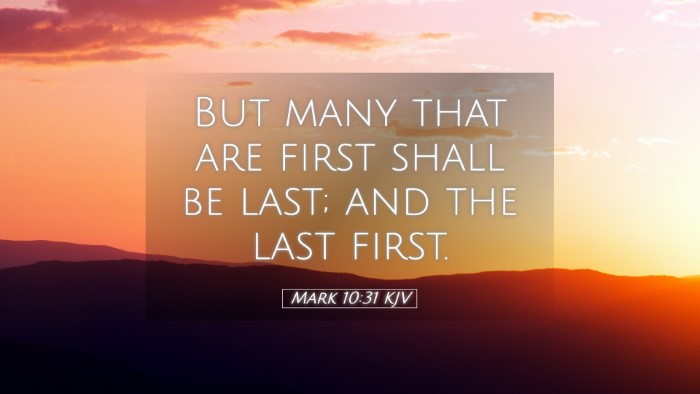Commentary on Mark 10:31
Verse: "But many that are first shall be last; and the last first." (Mark 10:31)
Introduction
This verse poses a profound paradox central to the teachings of Jesus. It speaks to the reversal of societal values and the Kingdom of God. Those who seem to gain the most in this life—whether through wealth, power, or status—may find themselves at a loss in the eternal kingdom.
Contextual Analysis
This statement comes at the conclusion of Jesus’ teaching on wealth and the dangers of materialism. In Mark 10, Jesus addresses the rich young ruler who ultimately chooses his possessions over discipleship (Mark 10:17-27). The contrast between the rich and the poor sets the stage for understanding this reversal of status in God's kingdom.
Thematic Insights
- Reversal of Values: Jesus often turns conventional wisdom on its head. In Mark 10:31, it emphasizes that God's economy is not like the world's. The first shall be last, and the last shall be first. This theme resonates throughout Scripture, pointing to the humility and service that God values.
- Challenge to the Status Quo: This verse is both a comfort and a warning. It provides hope for those who are marginalized and oppressed, while also serving as a caution to the affluent and powerful, reminding them that earthly status does not equate to heavenly favor.
Commentary from Public Domain Sources
Matthew Henry's Commentary
Henry suggests that this statement serves to correct the misunderstanding of the disciples regarding greatness and reward in the kingdom of God. He elucidates on how those who are regarded as first in this life may encounter a harsh awakening in the judgment to come. Conversely, those who endure suffering and are marginalized may find unprecedented honor in God's presence.
Albert Barnes' Notes
Barnes emphasizes the idea that God’s grace does not operate based on human merit or social standing. He interprets this verse as a reassurance to those who feel undervalued or overlooked. Furthermore, he explains that this principle not only applies to individuals but can also be seen collectively, where nations or groups that appear to hold power may ultimately be judged justly by God.
Adam Clarke's Commentary
Clarke underscores the moral implications of this saying. He posits that true greatness in the spiritual realm comes through humility and servitude. Clarke interacts with socio-religious structures of the day, suggesting that Jesus’ message subverts a cultural hierarchy predicated on meritocracy. It is a reminder that God’s kingdom thrives on grace rather than human judgment.
Theological Implications
- The Nature of God’s Kingdom: This verse challenges believers to reevaluate their understanding of success and righteousness. It encourages an orientation toward humility and faith.
- Hope for the Oppressed: For those disenfranchised or marginalized, this verse is a promise of God’s justice and future exaltation within His eternal kingdom.
Practical Applications
Pastors, students, and theologians should consider how this verse instructs believers to live out their faith in today’s world. As followers of Christ, they are to embody the servanthood demonstrated by Jesus rather than pursue worldly acclaim. Additionally, church leaders should encourage communities that uplift the vulnerable and emphasize the inherent value of all individuals in God's eyes.
Conclusion
In summary, Mark 10:31 encapsulates a vital principle of Christian living and eschatological hope—a reminder that the last will be first. Engaging deeply with this text invites believers from all walks of life to reassess their pursuits and priorities in light of the coming Kingdom. It is an exhortation to seek first the humility that Christ exemplifies and to declare that, in Him, there is a redefinition of worth and greatness.


